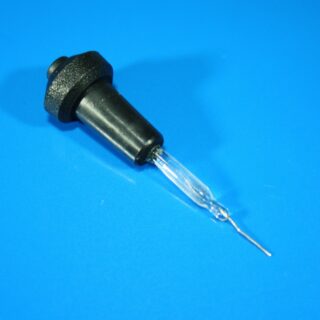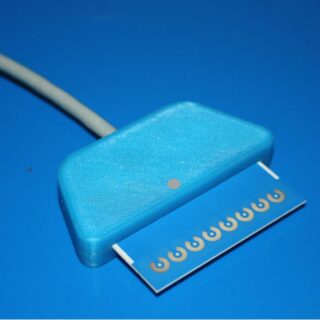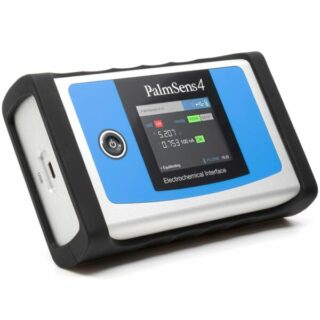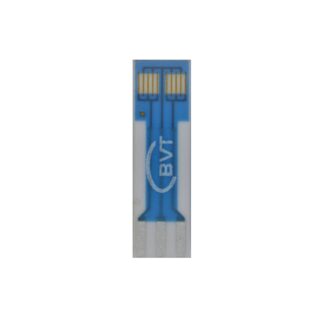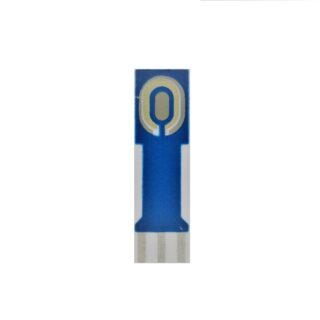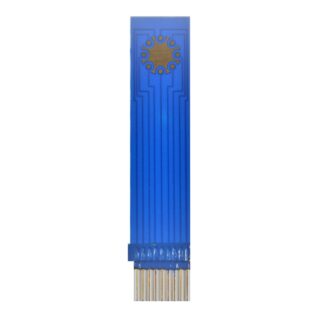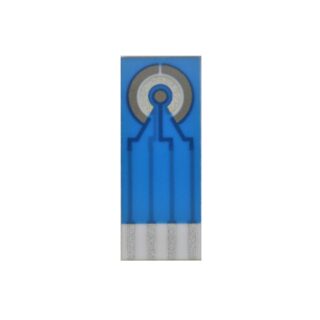Category
- CUSTOMER SERVICES
- NEW PRODUCTS
- Sensors and electrodes
- Custom made and Modified Screen Printed Electrodes
- Stirrers
- Cables and connectors
- Cell
- Potentiostats
- Manual Screen Printer
- Minithermostat
- Pumps
- Accessories
- Kits & Sets
- Discounted SPEs (at a reduced price with visual defects/inconsistancies, but fully functional)
AC5 Electrochemical sensor
Screen printed electrochemical array of 8 working electrodes
Dimensions: 25.4 x 50.8 x 0.63 mm
WE material: Au/Pt, Au, Pt, Ag, C
The sensor is formed on a corundum ceramic base. On to this surface the working and the reference electrodes are applied. The working electrodes create an array of eight electrodes. The electrodes can be made of variety of materials (see below). At the end of the sensor there is a contacting field which is connected with the active part by the silver conducting paths which are covered by a dielectric protection layer. A bio-chemically active substance can be immobilised on the working electrodes of the sensor.
You may also like…
-
PalmSens4
Read moreThe PalmSens4, is a USB and battery powered Potentiostat, Galvanostat, and optional a Frequency Response Analyser (FRA) for Electrochemical Impedance Spectroscopy (EIS).
Compact, versatile and powerful
- (Bi)Potentiostat / Galvanostat / Impedance Analyzer
- FRA / EIS: 10 μHz up to 1 MHz
- 9 current ranges: 100 pA to 10 mA
- 18-bit resolution
- Bluetooth or USB connection
The PalmSens4 has a large potential range (-5V to 5V or -10V to 10V) and current range (100 pA to 10 mA) with a high resolution and low noise. The economical PalmSens4 is a complete laboratory instrument but its compact and rugged design makes it also ideal for field work.
Connecting via Bluetooth guarantees a perfectly floating measurement.
More information can be found through the link: https://www.palmsens.com/product/palmsens4/
Configurable
PalmSens4 comes in different configurations:
- ±5 V or ±10 V potential range
- EIS/FRA with maximum frequency of 100 kHz or 1 MHz
- optional BiPotentiostat module for second WE
- optional iR-Compensation
Standard included
- Rugged carrying case
- High quality, double shielded cell cable with
2 mm banana connectors for Working, Counter, Reference electrode and Ground - Crocodile clips
- Dummy cell
- USB cable
- Manual and Quick Start document
- PSTrace software for Windows
Related products
-
CC2 Electrochemical sensor
Read moreA conductivity sensor with two active parts made by thick film technology with interdigitated structure of electrodes
Dimensions: 25.4 x 7.26 x 0.63 mm
WE material: Au/Pt, Au, Pt, Ag, C
The sensor is formed on a corundum ceramic base. Onto this surface two interdigitated structures of electrodes are applied. The electrodes are made of Platinum-Gold alloy in standard product CC2.WS. At the end of the sensor there is a contact which is connected with the active part by the silver conducting path which is covered by a dielectric protection layer. A bio-chemically active substance can be put on the electrodes, one interdigitated structure, the second structure is reference.
-
AC1 Sw = 6.8 mm2 Electrochemical sensor
Read moreBasic amperometric low cost three-electrode sensor with patented structure made by thick film technology.
Dimensions: 25.4 x 7.26 x 0.63 mm
WE material: Au/Pt, Au, Pt, Ag, C
The sensor is formed on a corundum ceramic base. On to this surface the working, the reference and the auxiliary electrodes are applied. The working and the auxiliary electrodes are made of variety of materials. At the end of the sensor there is a contacting field which is connected with the active part by the silver conducting paths which are covered by a dielectric protection layer.
A bio-chemically active substance can be immobilised on the working electrode of the sensor to create a biosensor. All sensors can be equipped with heating and temperature sensing elements. Thermistor (must be calibrated) or Pt 1000 (the response corresponds to the ISO standard) is used as the temperature sensor.
We also offer:
- working electrode made of polished gold (WE diameter 1 or 2 mm) – sensor type: AC1P.W*.R*, with homogenous surface with roughness less than 1 µm
- working electrode made of a material of guaranteed purity of up to 99.99 % (WE diameter 2 mm) – sensor type: AC1.GP
We also offer activated graphite sensors on customer request.
See activation example below:
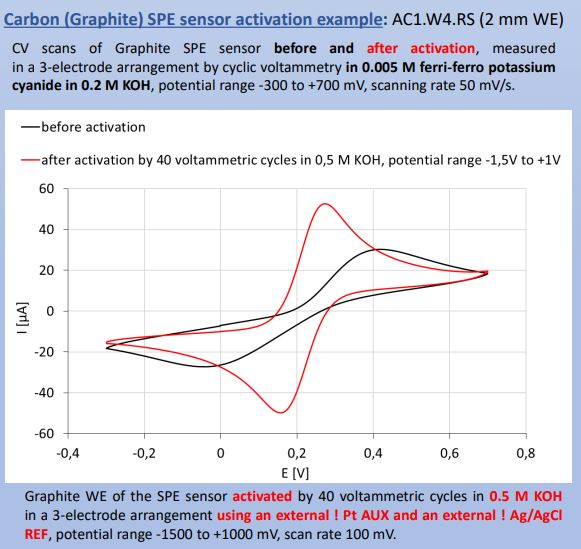
* Have a look at product cathegory Discounted SPEs – which include offer of Screen Printed Electrodes (SPEs) at a reduced Price from our AC1 line of Sensors. They are fully functional, but with visual defects or inconsistancies.
– ideal for use by students to gain handling experience and knowledge on SPEs and their uses
– ideal for initial experiments in research -
AC9C.WSP Electrochemical sensor
Read moreAmperometric sensor with an array of 8 working electrodes and 1 common reference electrode made by sputtering with integrated connector
Dimensions: 59.0 x 12.7 x 0.63 mm
WE material: Au
The sensor is formed on corundum polished ceramic base. On to this surface eight working electrodes, and the reference electrode are applied by sputtering. The working electrodes are made of gold. At the end of the sensor there is an integrated connector. It is connected with the active part by the silver conducting paths which are covered by a dielectric protection layer. Different bio-chemically active substances can be immobilised on the working electrodes of the sensor.
-
AC6 Electrochemical sensor
Read moreAmperometric three-electrode sensor with two auxiliary electrodes made by thick film technology
Dimensions: 25.4 x 10.16 x 0.63 mm
WE material: Au/Pt, Au, Pt, Ag, C
The sensor is formed on a corundum ceramic base. On to this surface the working, the reference and two auxiliary electrodes are applied. The electrodes can be made from variety of materials (see below). At the end of the sensor there is a contacting field. It is connected with the active part by the silver conducting paths which are covered by a dielectric protection layer. A bio-chemically active substance can be immobilised on the working electrode of the sensor.


